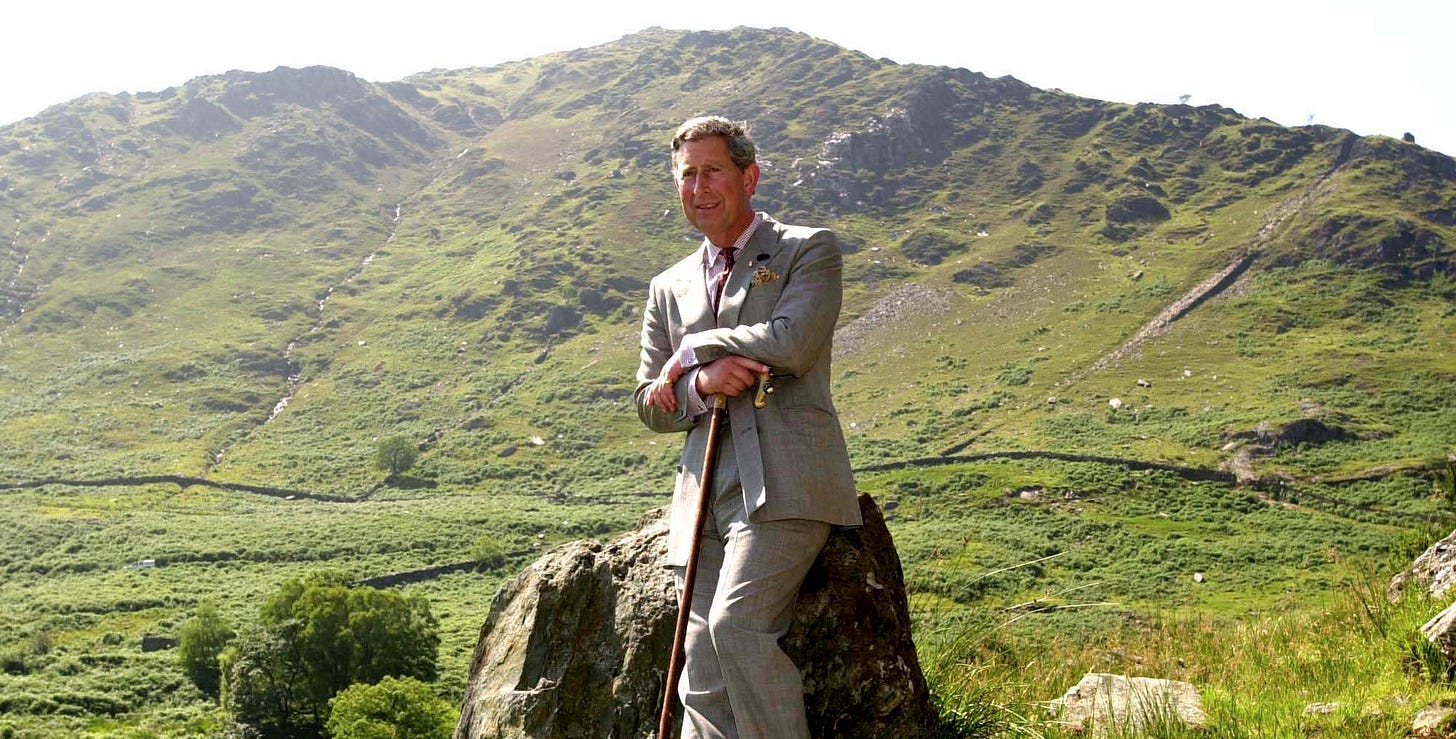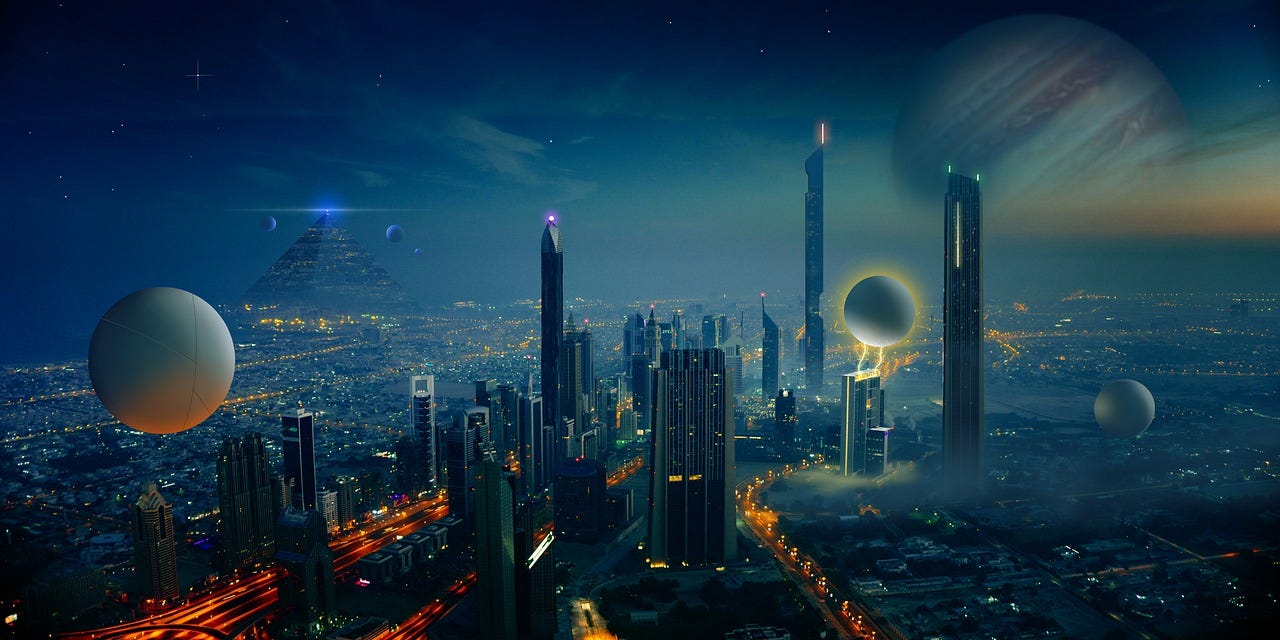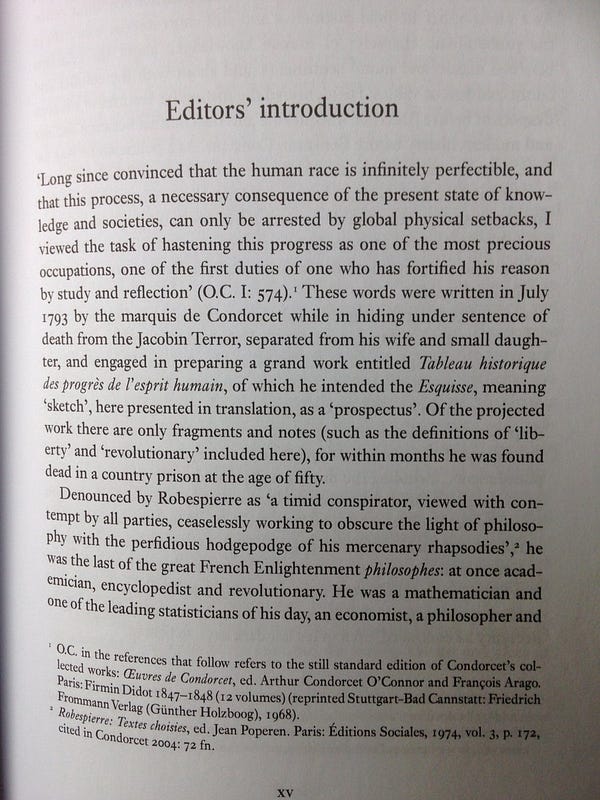My Substack overfloweth … so I thought I’d send it out. And you might get your next one at 10.15 am next Sunday rather than 10.15 am on Saturday as usual. But, as Dan Andrews would say, I’m not paid to speculate about the future.
Interpretation as wishing up the future
There was genuine grace in the first day or so of immediate reactions to the Queen’s demise as people reflected on their own surprise at how sad it made them. Sadly we’ve since got a firehose of commodified schlock. (If you look at the second video on this page, in a story dedicated to the relevance or otherwise of the funeral to Indigenous Australians, the ABC journo wraps up the story by describing the funeral to which this traditional aboriginal leader has been invited to as “one of the biggest events of all time”.)
Here the author has an interpretation of how what has been presented as Charles new age fecklessness might be something much more promising. Who knows? Certainly not me. But I was quite thrilled to learn of people like Guénon of whom I’m ashamed to say I knew nothing. And particularly the suggestion that “Guénon’s view that creativity should not be a mode of mere self-expression, but a vessel of transcendence”.
I’m familiar with this idea line of thinking from the philosophy of Michael Polanyi. While he celebrated the achievements of reductionism in science — as well he might — he regarded it as a disaster to take reductionism as a kind of ‘metaphysics of everything’ and cooked up his own theory of what I’ll call ‘progressive emergentism’. This is a kind of modern great chain of being beginning with physics, on which is built chemistry, on which is built biology, then sentience, then consciousness and then higher forms of consciousness like science, art, law and religion. As one moves upward, higher layers are dependent on the layer below, but are also more fragile than the lower layer, and so greater labour is involved in establishing and maintaining them.
One needn’t accept religion in this list in order to understand what he’s getting at, and if you’re concerned about it, it’s probably best to forget it and focus on the rest of the list. If you don’t fancy that, at least you can rest assured that, though Polanyi described himself as quite definitely religious and his philosophy has been taken up with some gusto by theologians, he was also OK I think, with describing himself as agnostic. In an interview in the 1960s, when asked “Does God exist?” he replied that the question is ill-formed, like the question “does truth exist?”. Anyway, that giant detour was designed to explain to you why I was glad I read this piece.
Is it insightful about what will happen? Who knows. Is it insightful as to what might lie within the new situation as a possibility? I thought so. And I hope so.

Beauty
It’s sad that it seems one needs to be a conservative to speak like this about beauty and, God forbid, taste, but there you go. Rather in the vein of the article above.


The horror of the human condition
Are we inherently individual beings nested among others, or are we better thought of as networked beings. I think Wittgenstein’s private language article suggests the latter. In any event here are two beings fused together in a terrifying story of love and hate.
Metaphors sustain us. I have always clung to the story in Plato’s Symposium of two halves meeting after a long separation in “an amazement of love and friendship and intimacy,” because the pursuit of this dream drives so many of us—or, at least, those of us who long to be irrevocably transformed by closeness. It lies at the core of the events that prompted the journey I’m taking now, which finds me sitting in a cold carriage on a fast train headed toward Haverfordwest, a small market town in southwest Wales. I am travelling into blackness, or, more specifically, blackness as a trope, blackness as it was defined and revised, espoused and abandoned, by two colored girls known as “the silent twins”—the identical twins June and Jennifer Gibbons, who, living in Great Britain with virtually no education and no peers, developed brutal skills of self-invention and cleaved to their own ferocious intimacy, their continually “amazed” relationship with their other half. For most of their lives together, they refused to speak to anyone but each other—a refusal that led to their emotional exile, their institutionalization, and, eventually, to the misguided appropriation of their story by activists and theorists who used it to pose questions about the nature of identity and the strange birthright that twins are forced to bear.
It’s long — the best part of 9,000 words.
I enjoyed this podcast on the much-maligned Persian Empire
Turns out, amid all the inevitable bloodshed which is synonymous with empire, they gave their dominions far more cultural autonomy than the Roman or British Empires. (But, you still got arrested for holding up #NotMyKing signs — no change there).
Democracy and the modifiers of modernity
Interesting opinion piece on democracy from the English version of the Greek newspaper Ekathimerini.
Three foundational pillars describe Athenian democracy: isopoliteia, isegoria and isonomia. “Isopoliteia” means equality to partake in governance, namely that every citizen could be elected and was elected to the political institutions of the city-state without even asking for it. Any citizen was eligible to serve as a judge/juror in the People’s courts, as a member of the Council of Five Hundred, and as other magistrates. Any citizen could be voted one of the Ten Generals (leaders and servants of the people). And most importantly, being a citizen makes an adult Athenian a member of the sovereign political institution of democracy: the Assembly of the People. This fundamental pillar of democracy, “isopoliteia,” which is the quintessence of the concept of democracy, has never existed in the Western world except in the ancient Greek world. The other two pillars, “isonomia,” equality before the law, and “isegoria,” equality and freedom of speech, appear in the liberal Western parliamentary republics of modernity in the form of individual rights. Yet, those stationed with social power and wealth have privileged access to these two pillars.
Excellent tweet thread on scale

The indefatigable Patricia Edgar on how Marshall McLuhan saw the catastrophe coming
Patricia Edgar has given this country much, most particularly a golden age of children’s television — which has sadly now been overcome by the great sausage machine of private capital and state capitalism. Another triumph for management.
It is more than 50 years since the astute cultural critic Marshall McLuhan burst into the academic world with his perplexing insights into the meaning of communications and how they would affect mankind. He declaimed, ‘The medium is the message’. I had just turned 30 and was enrolled for an MA in the Stanford University Communications Department. I didn’t understand what McLuhan meant, but as another popular ‘truth’ at the time was, ‘Don’t trust anyone over thirty’, I kept my mouth shut and listened.
McLuhan was the first to recognise media represented both opportunity and threat. They increased human control over our environment, but also increased the environment’s control over us. He foresaw how the media revolution would ‘change us’ producing ‘self-centredness in man, and a fragmentation in society.’ How right he was.
When I was growing up radio enjoyed pride of place. Most household activity took place in the presence of radio; the cooking, cleaning, eating, entertainment – cards and boardgames. The medium sat in the warmest room in the house where the family gathered. Multi-tasking while listening to radio was commonplace and we moved about. People weighed less than they do today.
Generally, conversation was part of the mix – except when the news came on. These were wartime years. The news was read in a sonorous voice, and we children were told to shush. We did, and it sounded important. When the idea of television was first mooted it was argued that the medium would fail, as people would not sit still to watch.
As the Network commercial broadcasters and Public Broadcasters struggled to find purpose for broadcast television (was it to be an advertising medium or a means of social and political education?), human behaviour changed. We took to television like ducks to water. Houses were redesigned with the television set as the focal point. The ‘family room’ was born. Conversation stalled. There was less interactive social activity. Board game sales declined. Fewer people learned a musical instrument. People sat, they moved and walked less, and as they became more passive, they became larger; the comfort foods and snack industry boomed.
Researchers counted advertisements and violent acts. There were concerns about effects on children. But while the data counters were looking at the symptoms, as McLuhan predicted, they were mistaking the trees for the wood. Even then, the media industries had barely got under way.


The privatised universe (only kidding!)
The New Left Review on the madness of space colonisation with what looks like a justified swipe at the Americans on the way through:
There is no limit to human megalomania. One recent example – which went largely unnoticed during this torrid and neurotic summer – was a bizarre exchange between NASA Administrator Bill Nelson and the Chinese authorities. ‘We must be very concerned that China is landing on the Moon and saying: “It’s ours now and you stay out”’, Nelson cautioned in an interview with Die Bild. A spokesman for the Chinese Foreign Ministry immediately hit back: ‘This is not the first time for the chief of NASA to lie through his teeth and smear China’.
Nelson’s accusation was strange, given that this December will mark fifty years since anyone has set foot on our natural satellite. …. The accusation was all the more outlandish given that it was the US, not China, that planned to launch a gargantuan rocket into space on 29 August, completing a few lunar orbits before returning to earth, all for the modest sum of $29bn. This would be the first leg of the Artemis mission – so-called after the Greek goddess of the moon and sister of the Sun-god Apollo – which eventually aims to establish a base worth $93bn on the moon by 2025. In theory, this lunar settlement will one day serve as a launch pad for a human expedition to Mars.
The mirage of space exploration obeys the same iron law which Horkheimer and Adorno identified in the culture industry. Namely, it works by indefinitely postponing satisfaction: ‘The culture industry perpetually cheats its consumers of what it perpetually promises. The promissory note which, with its plots and staging, it draws on pleasure is endlessly prolonged.’


Why you need to know about bridging algorithms
Well, I’ve been saying it since 2014. And it was mainly reportage. Anyway, I wanted to draw attention to this post again since movers and shakers have now noticed it and declared it “one of the best policy ideas on reforming social media ever”.


A bridging-based ranking system might infer societal divisions, and reward content that decreases the extent of those divisions. For example, imagine two potential articles that Twitter’s feed might show someone about immigration. One appears likely to increase divisions across opposite sides, another is more likely to decrease divisions. Engagement-based ranking would not try to take this into account—it simply factors in how likely one is to engage or stay on the app—which is likely higher for a divisive piece that leaves users ranting and doom-scrolling. Bridging-based ranking would instead reward the article that helps the opposing sides understand each other—that bridges the divide. …
As a concrete example, we probably won’t change engagement-based rankings problematic incentives for journalists and politicians by adopting a “choose your own ranking system” approach (unless they are all just variants on something like bridging-based ranking). As a result, I argue that alternative “platform democracy” approaches can be used to determine collectively what recommendation systems should reward—in ways that protect against autocratic abuse.
This may be particularly important because moving beyond engagement-based ranking might also negatively impact some platform’s business metrics (at least in the short run)—especially if it is competing with companies who are sticking with sensationalism.
If you do want to click through, the article is more long winded and academic than it need be IMO. Skim till you get to the sub-heading “An alternative "for good": Bridging-based ranking”.















